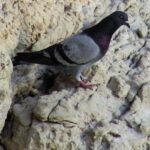Spectacular frog identified as new species and is named after curator’s three year old...
One of the world’s most spectacular frogs has been identified as a new species after 20 years of painstaking research at The University of...
Rare wild ancestors of feral pigeons found living on British and Irish islands
DNA testing reveals that the wild ancestors of the common domestic and feral pigeons, now extinct in many parts of the world, are still...
“Exceedingly rare” plant species face increased chances of extinction
According to new research nearly 40 percent of global land plant species can be categorized as very rare, and these species are most at...
Huge ecosystems could collapse in less than 50 years – new study
We know that ecosystems under stress can reach a point where they rapidly collapse into something very different. The clear water of a pristine...
Historic climate change on Mars might be detectable
Historical instances of extreme climate change on Mars could be detected through the measurement of subsurface temperatures, according to a new University of Stirling...
New techniques pioneered at Salford University show prosthetics users rely on intact limb
Researchers from the University of Salford have used new techniques to show that people with artificial arms and hands rely heavily on their intact...
Cutting-edge analysis of prehistoric teeth sheds new light on the diets of lizards and...
New research has revealed that the diets of early lizards and snakes, which lived alongside dinosaurs around 100 million years ago, were more varied...
Rare gas find solves African landscape puzzle
The discovery of gases released from deep beneath the Earth’s crust could help to explain Southern Africa’s unusual landscape, a study suggests.
Scientists have long...
Study reveals hostile conditions on Earth as life evolved
During long portions of the past 2.4 billion years, the Earth may have been more inhospitable to life than scientists previously thought, according to new computer simulations.
Using...
Earth’s nearest supergiant is cooling down at the end of its life
In late 2019 the red supergiant closest to Earth, Betelgeuse, began to rapidly fade in brightness. Initially thought to be a sign that the...










